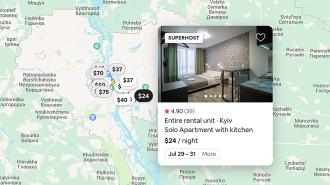Across the globe, people are booking Airbnbs in Ukraine not because they plan to use them, but as a way to get money directly to hosts living in the nation, which is currently under siege by the Russian military.
The challenge: Since Russia launched its invasion of Ukraine on February 24, people in all parts of the world have donated millions of dollars to organizations in support of the nation and its citizens.
Once the money is sent, though, it’s hard for donors to know exactly how it’s being spent or whether it’ll make a difference for people living in Ukraine.
“You can’t even imagine how pleased we are to hear we are not alone.”
Ukrainian Airbnb Host
The idea: One clever attempt to make an immediate, direct impact on the lives of Ukranians: booking Airbnbs in Ukraine’s hardest-hit cities and then messaging the hosts to let them know they won’t be visiting.
“For me it was the simplest way to feel connected to a person like boots on the ground,” Sarah Brown, who booked a four-night stay in Kiev for $200, told TODAY. “It just seemed like the natural thing to do.”
Posts spreading the word about this creative way to contribute to Ukrainian relief have been circulating on social media, along with screenshots of what Airbnb users say are messages from hosts in response to the bookings.
“You can’t even imagine how pleased we are to hear we are not alone, tears in our eyes,” reads one shared message. “I am very grateful to you for your support in this difficult time for us and all of Ukraine.”
Airbnb’s contribution: In response to news of the bookings, Airbnb has agreed to temporarily waive its guest and host fees for Airbnbs in Ukraine, meaning more of what a person pays for a rental will go straight to the host.
On March 4, the company revealed that Airbnb users had booked more than 61,000 nights in Ukraine in the previous 48 hours. More than half of the nights were reserved by people in the U.S., and the surge in bookings will put $1.9 million in the pockets of hosts.
In a separate initiative, Airbnb is also offering free temporary housing to 100,000 refugees displaced by the war. More than 1.2 million of Ukraine’s 44 million people have now fled the country, as Russian shelling of Ukraine’s cities intensifies.
Airbnb is temporarily waiving its guest and host fees for Airbnbs in Ukraine.
Beware of scammers: As with most anything online, there’s always the possibility that scammers will try to take advantage of people’s generosity, so if you’re interested in booking one of the more than 300 Airbnbs in Ukraine, be sure to do your homework first.
Hosts that have been with Airbnb for a while — you can see when they joined on the app — are probably more likely to be legit, as well as listings that have some sort of review history. (Of course, that will necessarily limit the number of people who can be helped.)
Once you’ve found a rental that appears to be on the up and up, you’ll likely want to book it for the soonest available date — hosts aren’t paid until after the check-in date, so that will ensure they get the money as soon as possible.
If donating through an Airbnb isn’t for you, you can still choose to support Ukraine through one of the many groups providing relief.
We’d love to hear from you! If you have a comment about this article or if you have a tip for a future Freethink story, please email us at [email protected].






